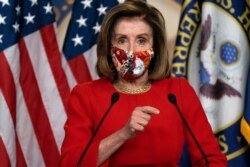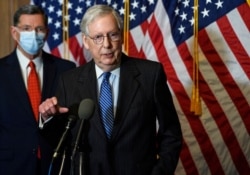With the clock ticking toward a potential U.S. government shutdown, President Donald Trump Sunday signed a $2.3 trillion funding measure that includes $900 billion for coronavirus relief and $1.4 trillion for government funding through next September.
The president had called the bill “a disgrace” after the House of Representatives and Senate passed it last week, capping months of negotiations in which Trump was little involved.
His objections surprised many who thought the president would support the funding measure, and brought a week of calls from Republican and Democratic leaders for him to sign it.
Without Trump’s signature or passage of a stopgap measure to fund operations, a partial government shutdown would have begun Tuesday. Increased unemployment benefits and eviction protections expired early Sunday.
“The signing of the bipartisan, bicameral coronavirus relief legislation is welcome news for the fourteen million Americans who just lost the lifeline of unemployment benefits on Christmas Weekend, and for the millions more struggling to stay afloat during this historic pandemic and economic crisis,” House Speaker Nancy Pelosi said in a statement late Sunday.
Senate Majority Leader Mitch McConnell praised Trump for preventing “a government shutdown at a time when our nation could not have afforded one.”
“The bipartisan rescue package that Republicans in Congress and the Trump Administration negotiated with the Democrats will extend another major lifeline to workers at struggling small businesses, renew major relief for laid-off Americans, invest billions more in vaccine distribution, send cash directly to households, and more. The compromise bill is not perfect, but it will do an enormous amount of good for struggling Kentuckians and Americans across the country who need help now,” McConnell said in a statement.
Trump said in announcing his signature that he was also insisting on changes to the funding legislation to remove what he called “wasteful items.” Those demands amount to suggestions to Congress and will not necessarily result in any changes to the bill.
His main objections to the funding package were what he said were insufficient $600 per person coronavirus relief payments, as well as funding for multiple government programs such as foreign aid and scientific research.
“As President, I have told Congress that I want far less wasteful spending and more money going to the American people in the form of $2,000 checks per adult and $600 per child,” Trump said in a statement.
Trump’s support for the larger checks had been seen as a rebuke to members of his Republican party, who resisted Democratic efforts to negotiate larger payments.
“I am signing this bill to restore unemployment benefits, stop evictions, provide rental assistance, add money for PPP, return our airline workers back to work, add substantially more money for vaccine distribution, and much more,” Trump added.
Democrats have characterized the relief bill as just a first step in their push for a more expansive aid package.
“We need to ensure robust support for state and local government to distribute and administer a vaccine, keep workers employed and prevent devastating service cuts – and we must do so as soon as possible,” Pelosi said.
Congress is interrupting its usual Christmas recess to return to work Monday to consider an override of Trump’s veto of a $740 billion bill funding the country’s defense programs. The measure would also give raises to members of the military and set Pentagon policy on issues such as troop levels, weapons systems and personnel matters.
The House is scheduled to vote Monday, and if it approves the veto override, the Senate could vote on the measure as early as Tuesday. A two-thirds vote in both chambers is required to override a presidential veto.
Trump has criticized the defense bill on several fronts, arguing without explanation that the bill benefits China. He has demanded the removal of language that allows for the renaming of military bases that honor Confederate leaders who seceded from the United States in the 1860s. He has also demanded the addition of a provision making it easier to sue social media companies over content posted by their users.
Pelosi called Trump’s veto “an act of staggering recklessness that harms our troops.”







